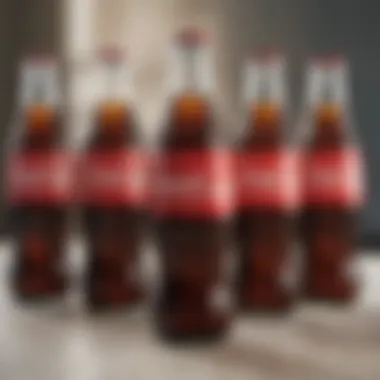Personalized Coke: Customization in Brand Engagement


Intro
The beverage industry has witnessed a significant transformation in recent years. Among the innovative strategies employed, the personalization trend stands out. One brand that has undoubtedly made a mark in this area is Coca-Cola. Through its creative campaigns, Coca-Cola introduced consumers to an experience where they could customize their drinks, thereby strengthening brand engagement and loyalty. The simple act of personalizing one’s beverage has turned into a powerful marketing tool.
This deep dive into the realm of personalized Coke will provide valuable insights regarding consumer behavior. It will outline how Coca-Cola leveraged customization to not только connect with consumers but also enhance their overall experience.
Consumers today are not just looking for products; they desire meaning and connection. Engaging with flavors that tell a story or hold a personal significance seems to resonate well. The personalization ethos elevates consumer expectations and paves the way for a new future in branding within the food and beverage industry. This exploration will also showcase how this strategy can have far-reaching implications and transform customer relationships.
For those interested in branding, marketing strategies, or simply enjoying a beverage, this article will shed light on each aspect and potential outcomes of personalized marketing.
Prelims to Personalized Coke
The evolution of branding has led to noteworthy changes in how businesses engage with consumers. Personalized Coke stands as a prime example of this evolution, intertwining customization with brand connection. Understanding the importance of this journey helps delineate the broader implications of personalized marketing. With shifts in consumer expectations, the desire for tailored experiences has become paramount. The nuances of custom offerings speak directly to emotional resonance, enhancing not only the individual consumer experience but also strengthening brand loyalty.
Corporate strategies are increasingly emphasizing personalization. Coca-Cola's endeavor into personalized labels encapsulates a broader trend in marketing—using consumer data to create goods that feel uniquely tailored. Unifying personalization with marketing facilitates an emotional bridge between the brand and the drinker. Aligning products with individual preferences fosters a sense of belonging among customers, promoting brand loyalty.
It's important to highlight how personalization creates differentiation in a saturated market. Coca-Cola distinguished itself by allowing consumers to see their names on products. This touchpoint observes a profound understanding of consumer psychology, effortlessly inviting participation and engagement.
In the world of beverage marketing, making consumers feel valued yields tangible returns in brand affinity and sales.
Ultimately, Personalized Coke not only represents a campaign but also a shift toward experiential marketing. By resonating with fundamental consumer desires, it amplifies both commitment to the brand and experiences associated with it. The discourse around this personalized journey provides valuable insights into how customization within branding captivates and retains modern consumers.
Defining Personalization in Marketing
Personalization in marketing refers to tailor-making messages, products, or experiences based on individual customer data. It the current consumer climate, relying solely on traditional advertising strategies proves insufficient. Instead, marketers shift toward fine-tuning their approaches to meet specific consumer needs. Personalized marketing employs data analytics, customer segmentation, and direct feedback.
Understanding personal preferences guides businesses to structure products that fulfill direct consumer demands. By developing a personalized facade, brands indulge in desires of individuality. Through this lens, advertising becomes less about one-size-fits-all solutions and more about refined touchpoints with the audience.
Several engagement benefits arise with strong personalization initiatives:
- Enhanced Customer Experience: Tailoring products adds perceived value.
- Increased Engagement: Encourages consumers to interact, leading to organic brand promotion.
- Loyalty Evolution: Builds stronger bonds as customers feel recognized and appreciated.
- Higher Sales Conversion: Personalized experiences correlate to better sales performance.
In the broader landscape, personalization facilitates richer implications such as customer retention and long-term brand loyalty. All this ties seamlessly into Coca-Cola's execution of its brand strategy. By mastering this approach, Coca-Cola not only aligned its identity with cultural relevance but also established itself in consumers' daily lives, leveraging simplicity in its product while complexifying the emotional experience surrounding it.
Historical Context of Coca-Cola
The historical context of Coca-Cola is not just a narrative of a drink; it's about understanding how a beverage transformed from a local apothecary creation into a global cultural icon. This section emphasizes the role that history plays in shaping consumer perceptions and marketing strategies. By exploring the origins and key milestones in Coca-Cola's journey, we gain insights into how past experiences have sculpted today’s personalized marketing tactics, especially in the context of customized branding efforts.
Coca-Cola's Origins and Evolution
Coca-Cola began its life in 1886 in Atlanta, Georgia. Inventor John Stith Pemberton sought to create a physique tonic made from a combination of coca leaves and kola nuts. This initial formulation reflected the medicinal trends popular in the late 19th century.
As demand grew, the formula evolved. Asa Candler, another pivotal figure, purchased the recipe and incorporated savvy marketing tactics that boosted brand visibility. His strategic approaches included innovative advertisements and creating a distinct brand identity. By creating captivating promotions and using distinct bottle designs, Coca-Cola transcended its medicinal roots to become a household name.
Over decades, global fervor expanded the brand’s reach, bringing it to untapped markets. This evolution showcased responses to consumer preferences and societal shifts, laying the groundwork for contemporary personalization strategies.
Key Milestones in Brand History
Several key milestones exemplify how Coca-Cola has navigated challenges and opportunities in brand history, forming a blueprint for market engagement.
- World War II Impact: Coca-Cola's commitment to providing the drink to soldiers solidified its role in American culture. This fortuitous pivot created a global affection for the brand, proving the power of market responsiveness.
- Advertising Evolution: The 1970s brought campaigns emphasizing happiness and enjoyment, a shift solidified by iconic ads and jingles. This era set the stage for later personalized campaigns.
- Share a Coke Initiative: Launched in 2011, this reformulated brand strategy allowed consumers to purchase bottles with personalized labels featuring popular names. It solidified emotional connections with consumers, fostering a deeper engagement that was revolutionary.
Each of these milestones reflects a proactive approach to consumer relationships and illustrates Coca-Cola’s adaptation in the rapidly evolving beverage industry.
The historical persistence of Coca-Cola demonstrates that a strong brand narrative garners loyalty, providing essential lessons for businesses engaged in personalization efforts.


Understanding Coca-Cola’s evolution in this context is crucial for making sense of its branding strategies today. Personalization in marketing requires examining how historical influences shape current consumer engagement tactics. As we delve deeper into Coca-Cola's campaigns, these foundational insights become increasingly relevant.
The Personalization Campaign
The concept of personalization in marketing has gained significant traction in recent years. This is especially true in the beverage industry, where brands aim to create a more intimate connection with consumers. The Personalization Campaign highlights this trend, allowing businesses to delve deeper into consumer preferences and behaviors. It provides a framework for brands to approach marketing with a human-touch, changing the dynamics of how they engage their audiences.
The Coca-Cola Company exemplifies this in its ongoing efforts to enhance consumer experience through personalized marketing initiatives. The importance of The Personalization Campaign lies in how it crafts distinctive consumer journeys, heightening brand engagement. By tailoring products to meet individual needs, companies like Coca-Cola strengthen consumer loyalty and drive user satisfaction.
Factors such as shifting market demands and advances in data analytics are central to amplifying these campaigns.
Personalization transforms a user’s interaction from transactional to relational, turning one-time buyers into loyal customers.
Overview of the Share a Coke Initiative
The Share a Coke initiative stands out as a hallmark of Coca-Cola's personalization strategy. Launched in Australia in 2011, this initiative instructed consumers to find cans and bottles with their names on the labels, inspiring a sense of ownership and connection. The simplicity of such personal touch could easily resonate with the consumers. Reducing the drink’s label to a name humanized the brand and encouraged people to share their experiences thereupon.
The campaign was about more than just names; it explored themes of relationships and interactions. Several brands have actively embraced such sentiments, but Coca-Cola’s approach with the “Share a Coke” campaign created an emotional context that drew people into the experience.
In addition, the use of social media amplified the effect. Customers began sharing pictures of their personalized drinks with their names, effectively promoting the product by the creators – the consumers themselves.
Benefits of the Share a Coke Initiative
- Emotional Connection: The proprietary focus on individual names established emotional leverage among consumers.
- Social Engagement: It instigated widespread social media participation, worth far more than traditional advertising.
- Boosted Sales: Coca-Cola reported significant sales increases and brand reverberation globally.
Coca-Cola's “Share a Coke” initiative is a striking example of how focused personalization can redefine customer relations.
Implementation of Personalized Labels
The execution of personalized labels is fundamental to The Personalization Campaign. Coca-Cola skillfully rebranded their product packaging to indulge individual consumer identities. The personalized label strategy involved not only names but extends to custom phrases and images relevant to cultural trends.
This method required advanced data solutions to print high volumes of various label designs yet maintain unique personalization on every bottle. Manufacturing challenges loomed large, but Coca-Cola embraced innovation in bottling and design processes to overcome these obstacles.
Advantages of personalized labels are noteworthy:
- Brand Differentiation: Customization allows Coca-Cola to stand apart in a saturated beverage market.
- Collectible Quality: Many customers view personalized products as unique items worthy of collecting.
- Market Flexibility: Capitalizing on seasonal events, sports, or local trends welcomed wider consumer reach.
In recent actions, such implementations have expanded into digital spheres, where customers can even design virtual Coke labels for sharing on social networks. This closing aspect reinforces the connection between digital consumption and traditional purchases.
Overall, these methods illustrate how marketing innovation rooted in consumer-centric methodologies can maintain relevance and relevance over time.
Consumer Engagement Strategies
Consumer engagement strategies are vital for the success of personalized Coke and similar campaigns. They encompass the methods used by brands to connect and communicate with their audience. For Coca-Cola, this involves various tactics that aim to enhance consumer interaction and cultivate a sense of belonging among customers. Effective engagement strategies can bridge the gap between brands and consumers, strengthening loyalty and driving sales. This section will focus on two primary elements within the overarching theme of consumer engagement strategies: building emotional connections and utilizing social media for interaction.
Building Emotional Connections
The foundation of any successful marketing initiative often lies in the ability to foster emotional connections with consumers. Coca-Cola's personalized campaigns are particularly adept at establishing these bonds. By allowing consumers to customize their Coke bottles with individual names or phrases, the brand moves beyond traditional transactions. Instead, it fosters a sense of personalization and humanity in its products.
This connection remanifes in several ways:
- Identity Affirmation: Personalized products resonate with consumers because they reflect their identities. A bottle with one's name feels special. It is a small representation of the individuality people cherish.
- Memorable Moments: Brands like Coca-Cola can capitalize on significant life events, such as birthdays or holiday gatherings. Customized labels make these moments more personal and help create lasting memories.
Furthermore, users are increasingly drawn to brands that communicate authentically, enhancing both trust and emotional resonance. Brands can nurture these connections by engaging with consumers’ feelings and values through collaborations, interactive campaigns, and immersive experiences that go beyond the simple drinking experience.
Utilizing Social Media for Interaction


Social media serves as a crucial platform for brands seeking to foster consumer engagement, and Coca-Cola has effectively embraced this channel. The brand’s Share a Coke campaign integrated the power of social media into its strategy, encouraging consumers to share images of their personalized bottles online.
There are several strategies that Coca-Cola has implemented on social media:
- User-Generated Content: By inviting consumers to post photos with their customized bottles on platforms like Instagram and Facebook, Coca-Cola taps into the creativity of its audience, turning consumers into brand ambassadors.
- Engagement Through Hashtags: Promoting specific hashtags facilitates broader interaction among customers. This practice not only increases visibility but also connects fans under a common identity.
- Targeted Advertising: Utilizing algorithms that cater to specific audience behaviors allows Coca-Cola to refine its marketing efforts, ensuring the right campaigns reach the appropriate users.
Not only do these strategies heighten awareness, but they also encourage participation from the community. Heightened engagement on social media ultimately fosters a deeper connection that translates to increased purchases and consumer loyalty over time. Tender engagement encourages consumers to be part of the ongoing narrative We now find ourselves navigating an evolving landscape in which personalization remains not just a trend but an expectation among savvy consumers.
In the age of customization, brands must embrace engagement strategies that resonate on emotional and social levels, creating connections that are meaningful and lasting.
Cultural Impact of Personalized Coke
Personalized Coke has crafted significant waves in the marketing and consumer engagement sectors, reflecting broader transformations in consumer behavior and cultural expectations. By blending nostalgia with modernity, personalized products seem to resonate effectively with today's generation that craves individuality and relevance from brands.
Thanks to personalized marketing methods, brands can touch consumers deeply. Coca-Cola capitalized on this cultural shift through various initiatives, encapsulating insights that transcend traditional marketing. This approach elicits responses not just from individuals, but also influences communal culture.
Personalization in Modern Consumer Culture
Today’s consumers have a robust expectation for customization as a standard in their purchase experience. Personalization has become synonymous with choice and connection. It allows individuals to engage beyond the transactional essence of consumption, fostering a sense of personal attachment to products.
Market researchers indicate that personalized products generate a higher emotional impact. For instance, when someone shares a Coke with a friend or family member, it isn’t only a drink. It symbolizes connection, memories, and shared experiences.
With personalization so ingrained in the consumer experience, brands like Coca-Cola found ways to integrate personalization into their identity. From physical labels that bear names to guages on emotional engagements, it constructs an environment where each interaction feels more relevant and valued.
The Role of Personalization in Brand Identity
The incorporation of personalization in branding gives rise to a distinctive brand identity that resonates well beyond traditional practices. When Coca-Cola introduced custom labels, it didn’t simply add names—it created tailored narratives that spoke to emotional and cultural contexts.
Benefits of Personalization in Brand Identity:
- Enhanced Customer Loyalty: Personal touch modifies a standard experience into something memorable, facilitating repeat interactions.
- Increased Premium Value: Consumers often perceive personalized products as more valuable, allowing brands to justify higher price points.
- Empowered Consumer Engagement: Consumers feel an investment in brands willing to listen and engage through customization.
In this landscape, personalization evolves from a mere marketing strategy into a vital component of brand identity itself, forming lasting relationships with consumers who seek connection and relevance.
As the food and beverage industry continues to evolve, the role of personalization only stands to strengthen. Businesses that discover and cultivate personal engagement opportunities can expect not merely to establish unique identities but to form indelible consumer bonds.
Marketing Insights on Personalization
The rise of personalization in marketing, especially in the beverage industry, cannot be overstated. This section examines its significance within the context of Coca-Cola's ongoing personalization efforts. Understanding this aspect helps to uncover how effective tailored marketing strategies can foster deeper connections between brands and consumers.
Data-Driven Approaches to Customization
Coca-Cola's success in the realm of personalization stems largely from its data-driven strategies. The use of consumer data allows companies to tailor their products and marketing to meet specific preferences. By analyzing purchasing patterns, social media behaviors, and customer feedback, Coca-Cola can glean insights into what flavors, names, or promotional offers resonate with their audience.
- Personal Profiles: Utilizing customer loyalty programs, Coca-Cola collects detailed consumer insights. These profiles enable more targeted marketing efforts.
- Predictive Analytics: By applying machine learning algorithms to analyze data, Coca-Cola can more accurately predict future consumer behaviors.
- Segmentation: Identifying distinct consumer segments allows for personalized marketing opportunities. This results in tailored campaigns designed to captivate various audiences, making it clearer which products appeal to each group.
Utilizing an array of analytical tools, Coca-Cola crafts experiences that feel uniquely made for each customer, thus driving engagement and loyalty.
Challenges in Personalization Strategies
While marketing personalization offers numerous advantages, it does come with its set of challenges. These hurdles must be navigated carefullyf to ensure effective implementation of personalization campaigns.
- Data Privacy Concerns: With growing awareness of data privacy laws such as GDPR, consumers are more cautious. Managing personal data needs transparency and above all, trust from the consumers.
- Information Overload: Over-customization can lead to confusion. If customers are bombarded with too many options, they may hesitate in making a purchasing decision.
- Cost and Resource Allocation: Developing personalized campaigns often calls for significant investment. Smaller companies may struggle to adopt advanced measures utilized by giants like Coca-Cola.
Understanding these challenges is essential for companies wishing to emulate Coca-Cola’s personalized strategies. Effective management of these elements can lead to sustainable and meaningful consumer relationships.


Consumer Expectations and Responses
Understanding consumer expectations and their subsequent responses is critical in the landscape of personalized marketing. This section of the article sheds light on how personalized Coke has transformed consumer interactions. In today’s competitive market, businesses must go beyond traditional strategies. They need to cultivate a connection that caters specifically to the individual. When brands engage in personalization, they speak directly to the dining needs, preferences, and even emotional senses of their consumers.
Trends in Consumer Preferences
In recent years, consumer expectations have evolved significantly, manifesting in various preferences for personalized products. People are actively seeking experiences that feel unique and tailored. Integrated campaigns can directly link consumer desires to the products offered. The following factors illustrate this trend:
- Desire for Personal Connection: Many consumers today appreciate brands that recognize them. Personalization fosters a personal connection that makes consumers feel valued.
- Convenience: Consumers prefer effective solutions without excess effort. Personalized options simplify decisions.
- Social Responsibility and Conscious Choices: Increasingly, shoppers care about sustainability. They expect brands to deliver environmentally friendly products and practices.
- Cultural Resonance: Products that reflect individual heritage and personal lifeways align closely with consumer sentiment and engagement.
Each of these preferences underlines the essential truth: Brands must listen if they want to succeed with personalized offerings.
Feedback Mechanisms for Personalized Products
Feedback is a critical aspect of navigating consumer expectations. When companies like Coca-Cola embrace feedback mechanisms, they can continuously improve their product offerings based on actual consumer responses. Methods to collect feedback include:
- Surveys and Polls: Online surveys directly question consumers about their likes or dislikes regarding specific personalized products.
- Social Media Engagement: Platforms like Facebook allow direct interaction with consumers. Brands can analyze likes and comments for insights.
- User Reviews: Encouraging customers to leave reviews on personalized products constructs a feedback loop where businesses can see the impact of their efforts.
- In-Store Feedback: Using QR codes or personalized receipts allow customers to provide immediate reactions in the retail space.
These feedback methods enable live responses that can direct companies toward crafting better products in future campaigns.
Brands attentive to feedback experience greater success in their personalized marketing strategies. Personalization will continue to reflect consumer expectations accurately when systematic feedback integration becomes standard practice.
Future of Personalized Beverages
The future of personalized beverages is an exciting frontier for both marketers and consumers. As personalization becomes increasingly integral in various sectors, its implications for beverages cannot be ignored. Consumers expect experiences over products, and personalization caters precisely to this demand. Beverage companies must not only embrace personal insights but implement them in their strategies. This focus has potential for strong customer engagement and loyalty.
Innovation in Beverage Customization
Innovation will drive the future of beverage customization. Brands will need to explore technological advancements that facilitate personalized experiences. Options could include apps that allow users to create custom drink recipes or subscription services that adjust offerings to prefered flavors. The integration of Artificial Intelligence and data analytics is critical for collecting consumer preferences and predicting trends.
Here are some potential areas for innovation:
- Smart Packaging: Interactive packaging that changes based on consumer input can create tailored experiences.
- Digital Interfaces: QR codes that link to personalized content can enhance customer engagement with products.
- Flavor Development Algorithms: Using data to create unique flavor profiles based on regional or individual preferences.
As innovation unfolds, brands like Coca-Cola will need to remain at the forefront, leveraging technology to fine-tune their personalized strategies.
Potential Market Developments
Market developments in personalized beverages reflect changing consumer demands. There are several key trends to watch:
- Increased Consumer Demand: As consumers continue requesting unique flavors, companies must keep evolving. New offerings can range from customizable sodas to health-driven alignments, like sugar-free or vitamin-enriched options.
- Sustainability: Consumers are more aware of environmental implications. This drives companies toward eco-friendly practices while catering to personalized needs. Development of sustainable packaging and sourcing initiatives could be seen.
- Collaborations and Partnerships: Companies may partner with innovators in food tech or experiential marketing. This helps to access new tools and ideas for personalization.
As we look towards the future, personalized beverages will transform consumer expectations. Bridging innovation with strategy will ensure success in this evolving landscape.
The End
The examination of personalized Coke offers vital insight into the landscape of modern beverage marketing. Personalization represents a customized approach to consumer engagement, tailoring products to meet individual preferences. This article highlights how Coca-Cola's personalization campaign not only fostered emotional connections but also shaped brand loyalty.
Summarizing Key Points
Throughout this article, several key aspects of personalized Coke have been outlined:
- Historical Development: Tracing Coca-Cola's journey from its inception to its innovative campaigns.
- Personalization Impact: Analysis of how custom labels transformed consumer interactions and brand engagement.
- Adoption of Technology: Examination of data-driven approaches that enhance the customization process; linking customer preferences directly with product offerings.
Moreover, we have explored the implications of personalized marketing in a broader context, considering shifting trends in consumer behavior. The emphasis on emotional connections emerges as a consistent theme. Examples showcased how social media platforms, like Facebook, have been instrumental in promoting personalized interactions.
Final Thoughts on Personalization and Brand Loyalty
As we reflect on the outcomes of the personalization trend in beverages, Coca-Cola's success serves as a model worth noting. The initiative demonstrates that brands that adapt to consumer desires stand to gain considerable loyalty. Today's consumers seek experiences. Tailoring offerings aligns with their need for individual expression, enhancing their satisfaction levels. Therefore, continued evolution in personalization across the beverage industry will likely solidify deeper connections with consumers.
Therefore, personalized products do not just sell items, but they build a much stronger emotional and loyalty bond between brands and consumers.







